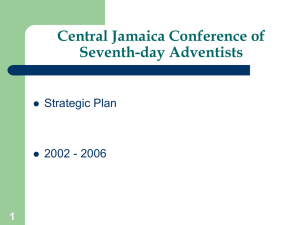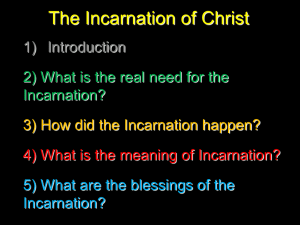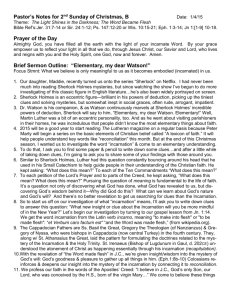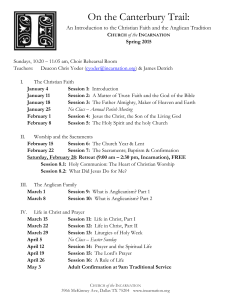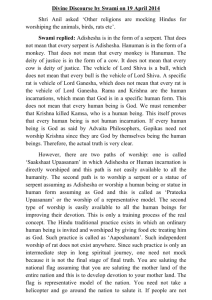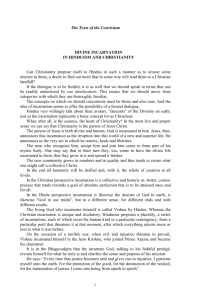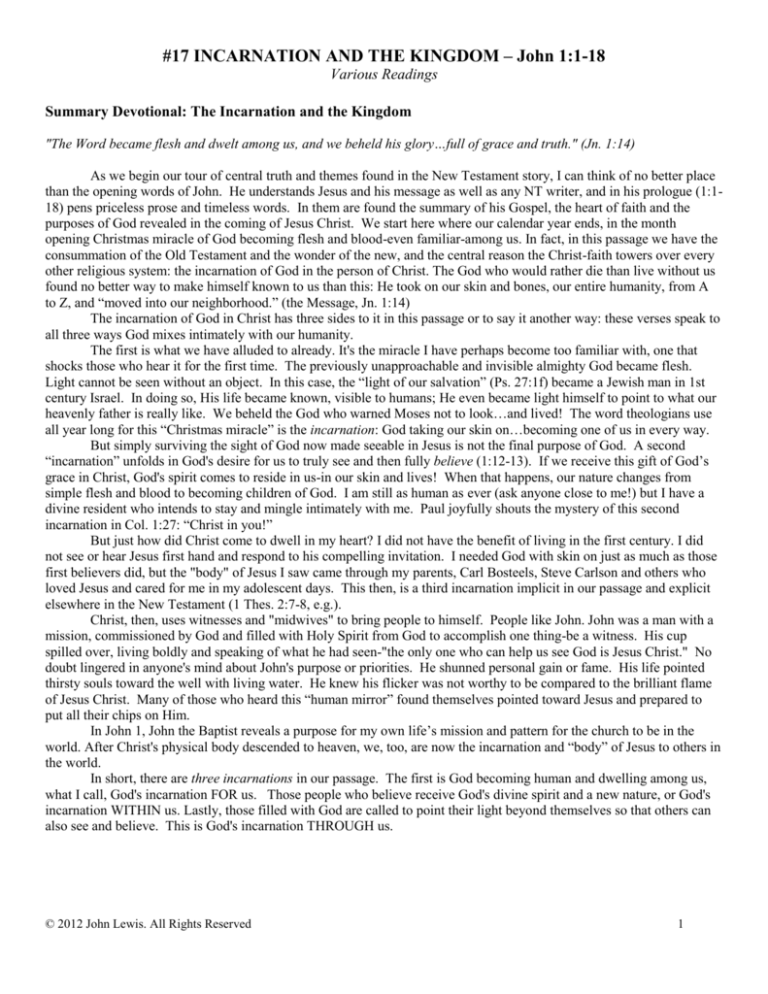
#17 INCARNATION AND THE KINGDOM – John 1:1-18
Various Readings
Summary Devotional: The Incarnation and the Kingdom
"The Word became flesh and dwelt among us, and we beheld his glory…full of grace and truth." (Jn. 1:14)
As we begin our tour of central truth and themes found in the New Testament story, I can think of no better place
than the opening words of John. He understands Jesus and his message as well as any NT writer, and in his prologue (1:118) pens priceless prose and timeless words. In them are found the summary of his Gospel, the heart of faith and the
purposes of God revealed in the coming of Jesus Christ. We start here where our calendar year ends, in the month
opening Christmas miracle of God becoming flesh and blood-even familiar-among us. In fact, in this passage we have the
consummation of the Old Testament and the wonder of the new, and the central reason the Christ-faith towers over every
other religious system: the incarnation of God in the person of Christ. The God who would rather die than live without us
found no better way to make himself known to us than this: He took on our skin and bones, our entire humanity, from A
to Z, and “moved into our neighborhood.” (the Message, Jn. 1:14)
The incarnation of God in Christ has three sides to it in this passage or to say it another way: these verses speak to
all three ways God mixes intimately with our humanity.
The first is what we have alluded to already. It's the miracle I have perhaps become too familiar with, one that
shocks those who hear it for the first time. The previously unapproachable and invisible almighty God became flesh.
Light cannot be seen without an object. In this case, the “light of our salvation” (Ps. 27:1f) became a Jewish man in 1st
century Israel. In doing so, His life became known, visible to humans; He even became light himself to point to what our
heavenly father is really like. We beheld the God who warned Moses not to look…and lived! The word theologians use
all year long for this “Christmas miracle” is the incarnation: God taking our skin on…becoming one of us in every way.
But simply surviving the sight of God now made seeable in Jesus is not the final purpose of God. A second
“incarnation” unfolds in God's desire for us to truly see and then fully believe (1:12-13). If we receive this gift of God’s
grace in Christ, God's spirit comes to reside in us-in our skin and lives! When that happens, our nature changes from
simple flesh and blood to becoming children of God. I am still as human as ever (ask anyone close to me!) but I have a
divine resident who intends to stay and mingle intimately with me. Paul joyfully shouts the mystery of this second
incarnation in Col. 1:27: “Christ in you!”
But just how did Christ come to dwell in my heart? I did not have the benefit of living in the first century. I did
not see or hear Jesus first hand and respond to his compelling invitation. I needed God with skin on just as much as those
first believers did, but the "body" of Jesus I saw came through my parents, Carl Bosteels, Steve Carlson and others who
loved Jesus and cared for me in my adolescent days. This then, is a third incarnation implicit in our passage and explicit
elsewhere in the New Testament (1 Thes. 2:7-8, e.g.).
Christ, then, uses witnesses and "midwives" to bring people to himself. People like John. John was a man with a
mission, commissioned by God and filled with Holy Spirit from God to accomplish one thing-be a witness. His cup
spilled over, living boldly and speaking of what he had seen-"the only one who can help us see God is Jesus Christ." No
doubt lingered in anyone's mind about John's purpose or priorities. He shunned personal gain or fame. His life pointed
thirsty souls toward the well with living water. He knew his flicker was not worthy to be compared to the brilliant flame
of Jesus Christ. Many of those who heard this “human mirror” found themselves pointed toward Jesus and prepared to
put all their chips on Him.
In John 1, John the Baptist reveals a purpose for my own life’s mission and pattern for the church to be in the
world. After Christ's physical body descended to heaven, we, too, are now the incarnation and “body” of Jesus to others in
the world.
In short, there are three incarnations in our passage. The first is God becoming human and dwelling among us,
what I call, God's incarnation FOR us. Those people who believe receive God's divine spirit and a new nature, or God's
incarnation WITHIN us. Lastly, those filled with God are called to point their light beyond themselves so that others can
also see and believe. This is God's incarnation THROUGH us.
© 2012 John Lewis. All Rights Reserved
1
All three incarnations grab my attention in one way or another. Verse 18 of our passage suggests that Jesus, as the
incarnation of God, is the Son who rests in the bosom of the Father. I remember the disciple of this gospel and of my own
name who rested his anxious head and troubled mind on Jesus’ bosom at the Last Supper table. That image, that divine
invitation made “flesh” speaks to the first incarnation and my ever present desire to know God more intimately.
I am also beginning-slowly but surely-to live more deeply into the mystery of the second incarnation of Christ in
my skin; this reality is slowly defrosting my own journey of knowing God and helping me become who I already am, a
new creation. God’s living in me is a verb, not a noun. Holy Spirit is not a deposit but a current that enables me to rise to
new places. I have this picture of being an air mattress laying flat on the ground, and discovering the switch on one of
those electric pumps…The spirit that raised Christ lives in me to raise me up, open my whole self to His created
possibilities and destiny. I am not stuck forever in my current behavioral ruts. He lives in me!
Lastly, and rightly so lastly, I am challenged to join others and together be Christ to a world that needs to see
Jesus. What are the tangible ways that Jesus is touched and seen in our ministries, families, neighborhoods, dorms,
friendships and workplaces? How do we do this together since we can’t do it alone? (Jn. 13:34-5, 17:21-23). How much
of this can be “intentional?” When I consider encountering Jesus in others and them through me, those moments often are
serendipitous and "unintentional," not part of the plans or program. Feeling deeply heard, seeing the sparkle in someone's
smile, hearing a timely word, receiving unsolicited help, being soothed by a gentle tone of voice…these stand out as the
lasting and tangible fruit of "Christ through me." They are part of what I will call the undramatic ministry of presence, a
significant part of what it will mean for me to be a loving person.
Here's the catch for a lot us who want to tract results or who are "reviewed" in ministry. While I am a tangible,
flesh and blood person to those I love and work with, God's divine work in and through me takes place in my skin and
bones but nevertheless is far less concrete than most would like. When the love of Christ is made most tangible, it is
simultaneously the least measurable. I can tally meetings, programs and numbers who participate; this works nicely for
making brochures and "justifying my existence." The truth is: programs can create space (or “skin”) for ministry to
happen, but programs do not automatically translate into ministry. Numbers merely tell us how many might have been
available to see or touch Christ through us, but they do not measure ministry. God's ministry through us eludes our
statistics. Those supervisors, ministers and believers who perceive "tangible ministry" primarily in terms of concrete
numbers and programs will find themselves working against the grain of God's economy. Yes, we still must have
meetings to schedule and programs to plan this week, but we can hold them with a holy laughter and open hands.
“Lord, birth through us unceasing miracles of your incarnation. May others taste and see that the Lord is good for
having been with us-and you- today.”
© 2012 John Lewis. All Rights Reserved
2




